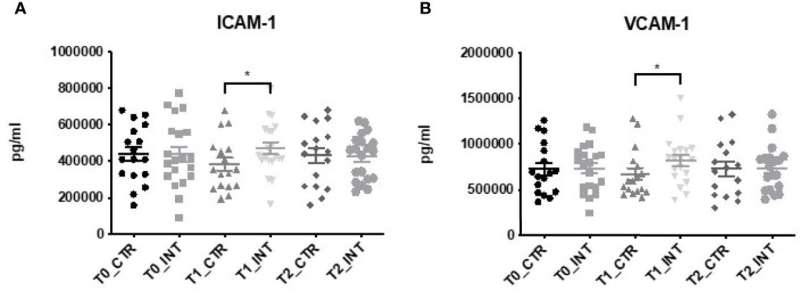Figure 1 Multiplex ELISA analysis of Vascular injury panel. Data at immediately post 12-week intervention (Time 1; T1) and at 3-month follow-up (Time 2; T2) was analyzed using linear regression models, adjusting for baseline values (T0). A significant increase in serum (A) ICAM-1 and (B) VCAM-1 expression was observed at T1 (*p ≤ 0.05). Credit: DOI: 10.3389/fonc.2021.669078
While the historical advice to cancer patients was rest and avoidance of physical activity, there is now compelling evidence which demonstrates that increasing physical activity is not only safe for cancer survivors but extremely beneficial in improving health related quality of life, reducing levels of anxiety, fatigue, and depression.
Cancer treatment (chemotherapy, radiation and surgery) often has a detrimental effect on health-related quality of life, and patients with oesophagogastric cancer (cancer of the food pipe and stomach) frequently struggle with loss of appetite, difficulty eating, sarcopenia (loss of muscle mass), fatigue, and post-operative weight loss. In addition, they often have poor cardiorespiratory fitness so there is a strong rationale to provide rehabilitation programs for oesophagogastric cancer patients.
A new study, which uses the recently developed multidisciplinary program ReStOre (Rehabilitation Strategies following Oesophagogastric Cancer), from researchers at the Trinity St James' Cancer Institute and partners, has demonstrated a significant improvement in cardiorespiratory fitness of oesophagogastric cancer survivors. The 12-week intervention study was recently published in the journal Frontiers in Oncology.
The ReStOre program aims to incorporate exercise rehabilitation with 1:1 dietary counseling and patient education sessions for patients with oesophagogastric cancer. Exercise rehabilitation strategies need to prevent excess weight loss in these patients.
As well as benefitting the cardiovascular systems and mental health, physical activity can also impact the body's cellular processes. Researchers assessed and explored changes in serum biomarkers in survivors of oesophagogastric cancer as a result of the ReStOre rehabilitation intervention. These blood biomarkers indicated angiogenesis, inflammation and vascular injury in trial participants.
The group previously showed that a combination of aerobic and resistance training improved physical, mental and social well-being. The published study showed that the exercise-based intervention improved some of the measured blood biomarkers which are involved in inflammation and cancer metastasis.
Key findings
- The ReStOre program has demonstrated that structured exercise rehabilitation resulted in improved confidence, physical, social and mental wellbeing of participants.
- Adherence to exercise was reflected in cardiorespiratory fitness levels measured by VO2 peak which were consistently higher in the intervention cohort compared to the control group.
- Cardiorespiratory fitness improved due to the ReStOre program.
- The study provided the data and justification for a definitive intervention ReStOre II clinical trial, which is recruiting 120 patients who have curative treatment for upper gastrointestinal and hepatopancreaticobiliary cancer.
- ReStOre II includes a upper gastrointestinal cancer survivorship biobank which will support further collaborative translational research in the area.
Professor Juliette Hussey, Discipline of Physiotherapy, School of Medicine, Trinity College and one of ReStOre's lead researchers said: "The ReStOre study was devised to determine if fitness could be improved with a multidisciplinary program of rehabilitation including exercise for patients after oesophageal cancer surgery. The study was powered to examine the impact on fitness but also provided the opportunity to explore the impact of the intervention on a range of circulating serum proteins. Significant changes were found in a number of biomarkers involved in inflammation and metastasis. This pilot work is important in informing our follow-on study ReStOre II which includes establishing a UGI cancer survivorship biobank for further collaborative translational biomarker studies. This initial work has been crucial in exploring changes in biomarkers in the blood as a result of a rehabilitation intervention where the main focus was on increasing fitness. The exercise intervention which included aerobic and resistance components lasted for 12 weeks, and it is possible that a longer time may be needed to lead to a more significant change in inflammation.
"This initial work will provide a strong background for future studies focused on examining how interventions with exercise can change the inflammatory blood profiles in patients with these types of cancer."
More information: Susan A. Kennedy et al, Effect of the Rehabilitation Program, ReStOre, on Serum Biomarkers in a Randomized Control Trial of Esophagogastric Cancer Survivors, Frontiers in Oncology (2021). DOI: 10.3389/fonc.2021.669078
Provided by Trinity College Dublin
























